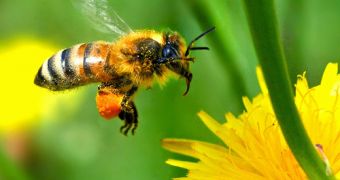A couple of days back, we talked about how a new research argued that, due to climate change and global warming, the planet stands to lose roughly 20% of its invertebrates population.
Naturally, this means that the global pollinators population is also quite likely to suffer a considerable decline.
Given the fact that pollinators (i.e. agents that carry pollen from one flower or plant to another and thus help accomplish fertilization) are the ones largely responsible for keeping both wild flora and crops up and running, it is no wonder that concerns are now raised with respect to how having fewer of them around will impact on the natural world and agricultural practices.
A recently published survey of general trends in the world's pollinators population argues that, because of considerable decrease in their numbers, the stability of food production now runs considerable risks.
Moreover, this could in turn lead to an increase in food prices, seeing how agricultural lands stand to yield significantly reduced harvests.
As we already pointed out, food prices are already subject to the effects of changing environmental conditions, which ever more frequently wreak havoc in crops worldwide, so this newly identified threat does anything but tone down concerns.
Commenting on these findings, Professor Ingolf Steffan-Dewenter, presently working with the University of Würzburg, Germany, made a case of how, “conservation of pollinators' habitats and implementation of agro-environmental practices to enhance wild plants resources and nesting sites for bees in agricultural landscapes are vitally important.”
Eurek! Alert informs us that presently about €153 billion worth of global crops rely on insect pollination, which is why these insect species need to be protected as soon as possible.
Interestingly enough, it seems that a group of farmers in the Chinese province of Sichuan have already been left with no other option but to pollinate apple flowers themselves, with the help of home-made brushes. Still, their method is hardly as efficient as natural pollinators are.

 14 DAY TRIAL //
14 DAY TRIAL //